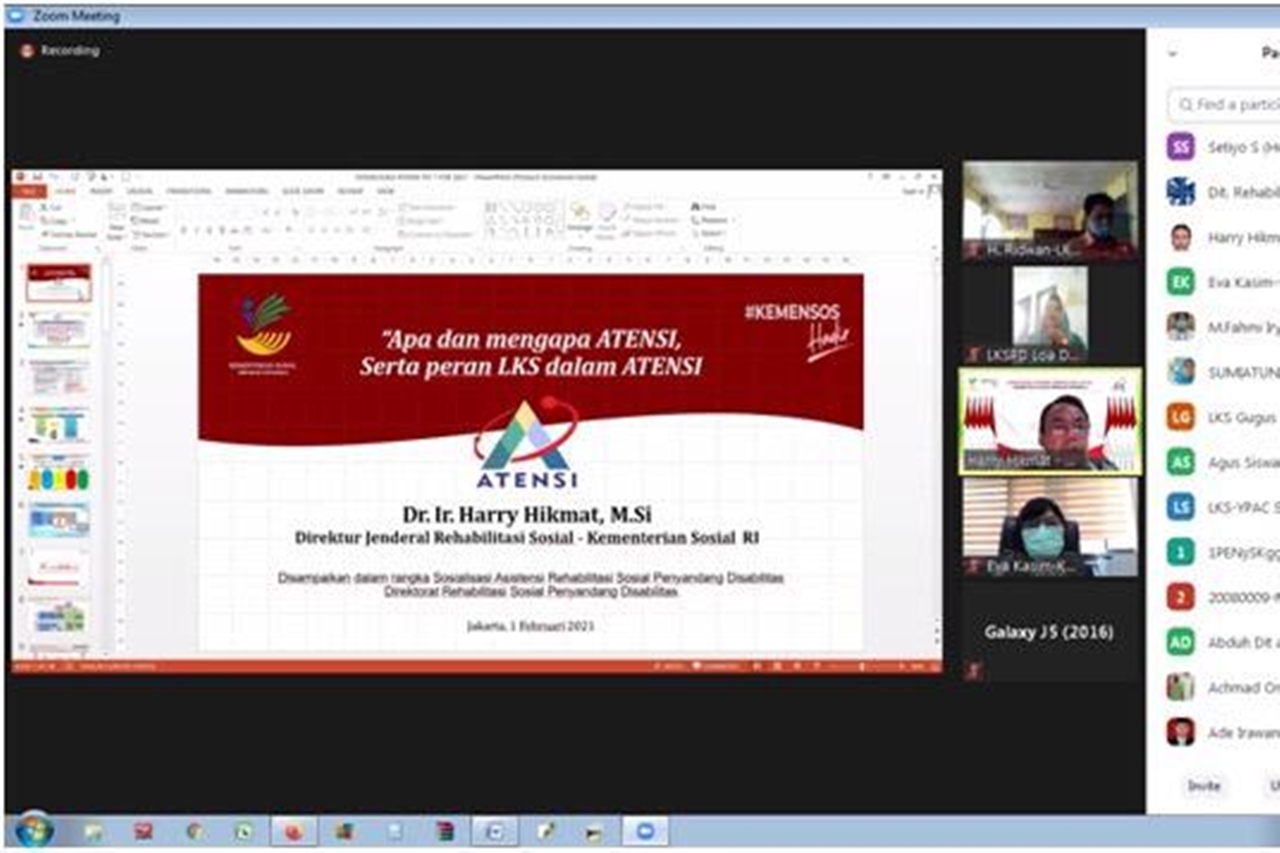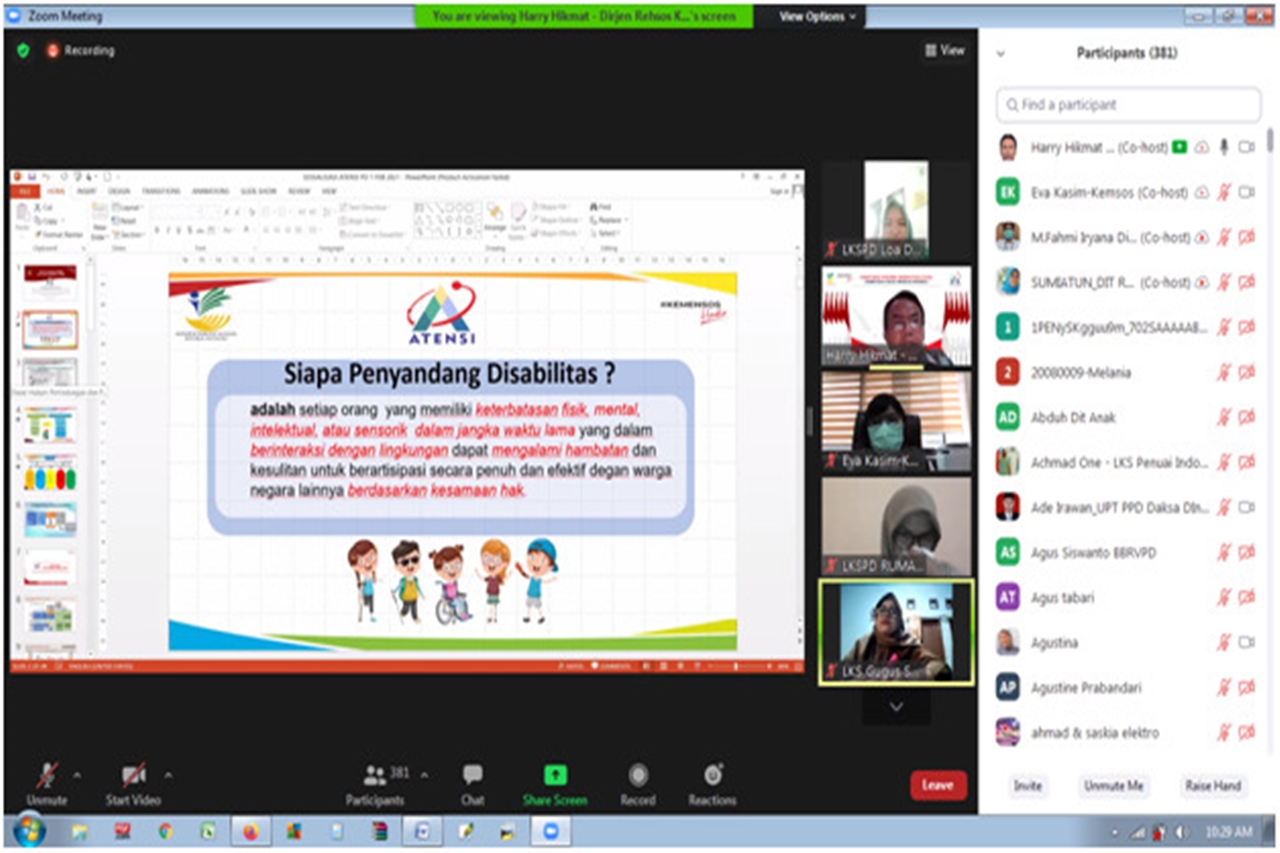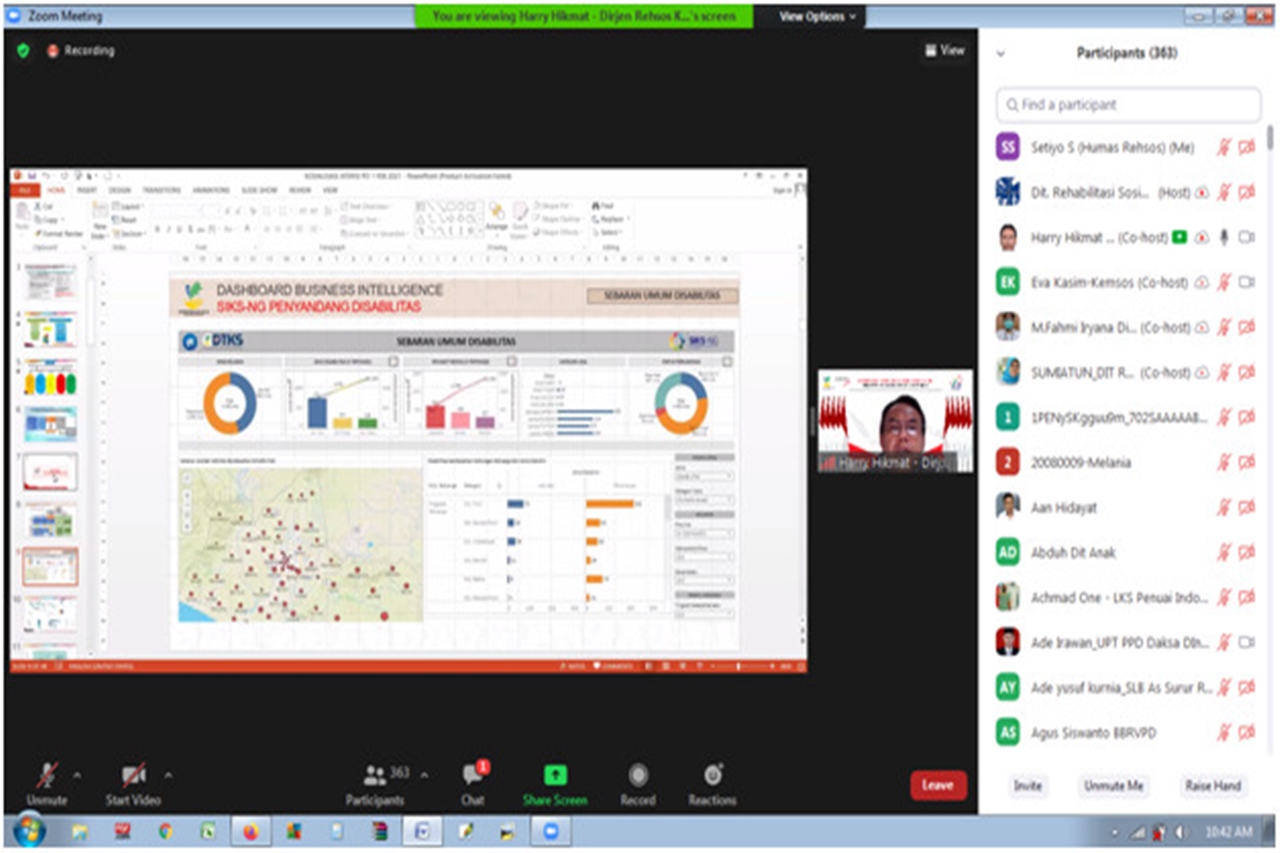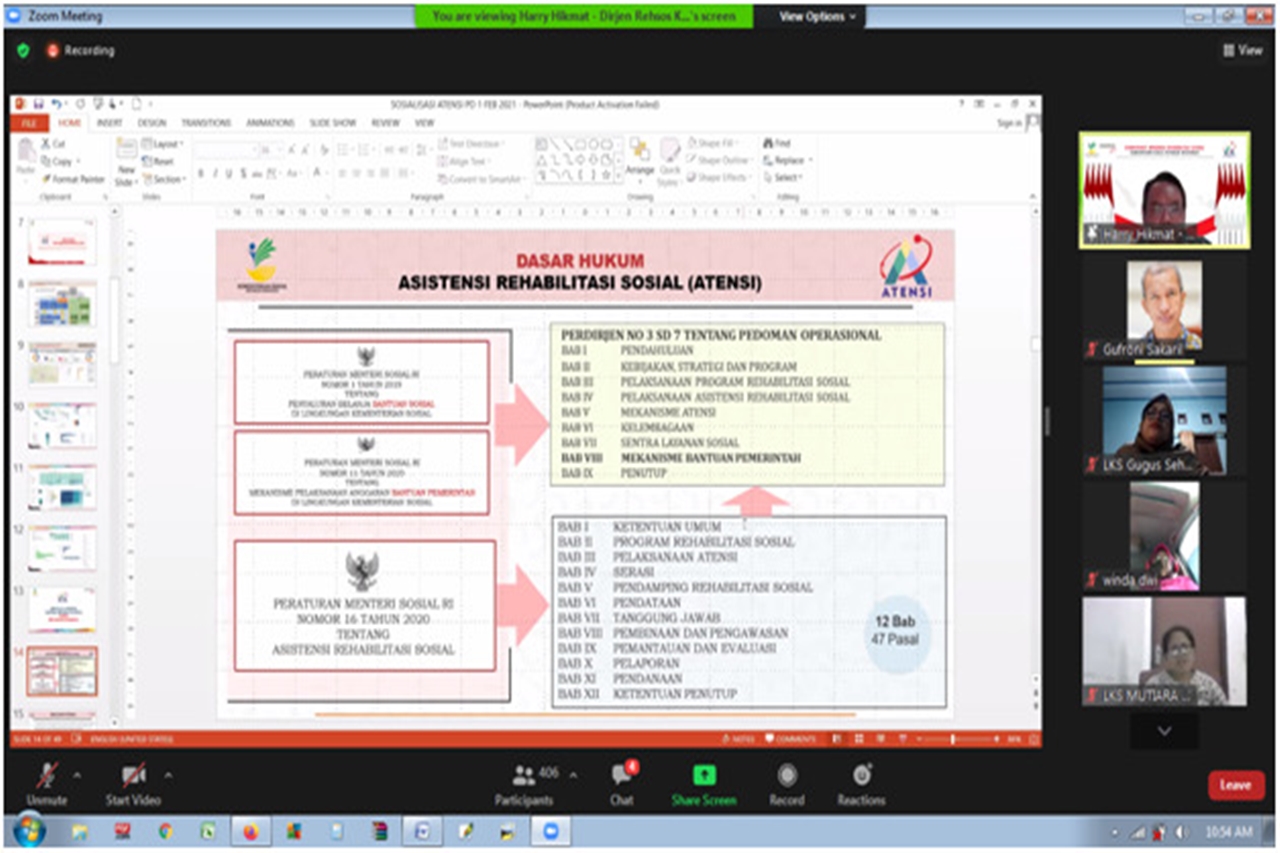JAKARTA (February 1, 2021) – The Indonesian Ministry of Social Affairs through the Directorate General of Social Rehabilitation continues to strengthen the role of stakeholders engaged in social rehabilitation or protection for persons with disabilities such as the Social Welfare Institution for Persons with Disabilities (LKS PD), Organizations for Persons with Disabilities (OPD) as well as the regional government and regionally owned Social Institutions in the implementation of the Social Rehabilitation Assistance (ATENSI) program for Persons with Disabilities.
This was conveyed by the Director General of Social Rehabilitation of the Indonesian Ministry of Social Affairs, Harry Hikmat when giving directions on the Socialization of Social Rehabilitation Assistance (ATENSI) activities for Centers/Loka/LKS PD and OPD. This activity was organized by the Directorate of Social Rehabilitation of Persons with Disabilities online and was attended by approximately 500 participants from various regions in Indonesia.
Harry conveyed that the legal basis for implementing the ATENSI program was the Minister of Social Affairs Regulation (Permensos) Number 16 of 2020 concerning Social Rehabilitation Assistance. The implementation of ATENSI will relate to the mechanism for distributing social assistance and the mechanism for implementing the government aid budget within the Ministry of Social Affairs.
Harry said the directions and policies of ATENSI PD that have been set are respect, protection and fulfillment of the rights of persons with disabilities, strengthening the social rehabilitation system that is integrated with social security, social empowerment and social protection of beneficiaries. Social rehabilitation is carried out by not only working on the program singly, but collaborating with many parties.
The next policy direction is to expand the reach of social rehabilitation of family, community and residential-based beneficiaries. In the future, the social rehabilitation service system will no longer rely on a residential or nursing home-based service system.
According to Harry, the existence of LKS PD is important, because in the future it will not rely on one approach, but will increase outreach efforts to families with disabilities which will expand the reach of services to people with disabilities. The Social Rehabilitation Centers, which are the Technical Implementation Unit (UPT) of the Ministry of Social Affairs, have tried to change the service system by expanding their reach to families and carrying out various activities in the community directly.
"For the Ministry of Social Affairs, the LKS position has an important role to ensure ATENSI can be carried out properly. Social welfare centers are required to collaborate with LKS when organizing various community-based activities," said Harry Hikmat.
This was conveyed by the Director General of Social Rehabilitation of the Indonesian Ministry of Social Affairs, Harry Hikmat when giving directions on the Socialization of Social Rehabilitation Assistance (ATENSI) activities for Centers/Loka/LKS PD and OPD. This activity was organized by the Directorate of Social Rehabilitation of Persons with Disabilities online and was attended by approximately 500 participants from various regions in Indonesia.
Harry conveyed that the legal basis for implementing the ATENSI program was the Minister of Social Affairs Regulation (Permensos) Number 16 of 2020 concerning Social Rehabilitation Assistance. The implementation of ATENSI will relate to the mechanism for distributing social assistance and the mechanism for implementing the government aid budget within the Ministry of Social Affairs.
Harry said the directions and policies of ATENSI PD that have been set are respect, protection and fulfillment of the rights of persons with disabilities, strengthening the social rehabilitation system that is integrated with social security, social empowerment and social protection of beneficiaries. Social rehabilitation is carried out by not only working on the program singly, but collaborating with many parties.
The next policy direction is to expand the reach of social rehabilitation of family, community and residential-based beneficiaries. In the future, the social rehabilitation service system will no longer rely on a residential or nursing home-based service system.
According to Harry, the existence of LKS PD is important, because in the future it will not rely on one approach, but will increase outreach efforts to families with disabilities which will expand the reach of services to people with disabilities. The Social Rehabilitation Centers, which are the Technical Implementation Unit (UPT) of the Ministry of Social Affairs, have tried to change the service system by expanding their reach to families and carrying out various activities in the community directly.
"For the Ministry of Social Affairs, the LKS position has an important role to ensure ATENSI can be carried out properly. Social welfare centers are required to collaborate with LKS when organizing various community-based activities," said Harry Hikmat.
The next strategic step for the Ministry of Social Affairs is (Directorate of RSPD) to no longer carry out direct services. The UPT of the Ministry of Social Affairs, namely the Social Rehabilitation Center/Balai/Loka, will carry out direct service activities continuously, including establishing partnerships with LKS. Duties and functions of UPT to become a One Stop Service, have a Social Service Center (SERASI) at the regional level by implementing the Centrelink System.
Meanwhile, the duties of the Center are related to policies, ensuring strategies, implementing social campaigns, supervising the regions, being involved in standardization and planning of social rehabilitation services, facilitating the preparation of general and technical guidelines as well as various coordinations, explained Harry Hikmat.
"Therefore, LKS PD please establish partnerships with Social Rehsification Centers in their respective regions. In practice, the Center can carry out monitoring and supervision," said Harry Hikmat.
Harry said ATENSI aims to improve social functioning which is detailed from increasing the ability of individuals, families and communities to fulfill basic needs, carry out social tasks and roles, and overcome problems in their lives.
Harry said the components of the Social Rehabilitation program include 7 indirect services and 7 direct services. Indirect services are carried out at the center, while the 7 components of direct services called ATENSI are carried out by Social Rehabilitation Centers/Loka.
Meanwhile, the duties of the Center are related to policies, ensuring strategies, implementing social campaigns, supervising the regions, being involved in standardization and planning of social rehabilitation services, facilitating the preparation of general and technical guidelines as well as various coordinations, explained Harry Hikmat.
"Therefore, LKS PD please establish partnerships with Social Rehsification Centers in their respective regions. In practice, the Center can carry out monitoring and supervision," said Harry Hikmat.
Harry said ATENSI aims to improve social functioning which is detailed from increasing the ability of individuals, families and communities to fulfill basic needs, carry out social tasks and roles, and overcome problems in their lives.
Harry said the components of the Social Rehabilitation program include 7 indirect services and 7 direct services. Indirect services are carried out at the center, while the 7 components of direct services called ATENSI are carried out by Social Rehabilitation Centers/Loka.
The ATENSI components are support for meeting the needs of a decent living; social care and/or childcare; family support; physical therapy, psychosocial therapy and mental spiritual therapy; vocational training and/or entrepreneurship development; social assistance and social assistance; and accessibility support can be ensured.
The implementation of ATENSI does not only revolve in the small scope , but also includes prevention efforts through various education, information, social campaigns, and various activities that can support sensitization of the community to disability issues.
Furthermore, Family Support (PKH, BPNT/BSP, KIP, KIS) was also carried out.On the other hand, there are family, community, and residential based care, care and protection efforts that are dynamic, integrative and complementary.
The ATENSI stage follows the stages of social work practice, from the initial approach, building collective agreements, conducting comprehensive assessments, making intervention plans, placing in families, communities and homes based on the results of the assessment, supervising service implementation, monitoring, evaluating the performance of program implementation, aftercare and termination.
The Director General of Social Affairs hopes that the implementation of ATENSI will not only be carried out by Social Rehabilitation Centers (Technical Implementation Unit of Ministry of Social Affairs), but become a platform for local governments (Institutions owned by the regional government), so that service collaboration in the field becomes more optimal.
"In the Permensos platform No 16 of 2020, it is more about how to provide services in a more comprehensive, integrated, complementary, mutually reinforcing and dynamic manner in practice based on case management," said Harry Hikmat.
According to Harry, data is very important when determining who the target of the ATENSI program is. Currently, the only data source used by the Ministry of Social Affairs is the Integrated Data on Social Welfare (DTKS) for Social Welfare Service Recipients (PPKS) for Persons with Disabilities (PD), which is managed by the Social Welfare Data and Information Center (Pusdatin) of the Ministry of Social Affairs. The determination of the beneficiaries of the ATENSI program must follow the provisions regarding the target system, which refers to the said DTKS PPKS PD.
For this reason, Harry hopes that LKS-LKS can register themselves in DTKS PPKS PD so that gradually LKS can help enter data for PDs that have been assisted so far. So that it is recorded in the national database system.
The Ministry of Social Affairs encourages LKS to actively register and participate in LKS accreditation. Accreditation is important to provide guarantees to the community that the LKS has met the minimum social service standards of a humanitarian nature that can be accounted for and useful.
Thus, it is hoped that if the LKS has been accredited, it will gain wider trust from the community and the government. The Ministry of Social Affairs is currently prioritizing partnerships with accredited LKS.
"Certification and Accreditation are one of the future commitments that must be built together so that the implementation of occupational and vocational services within the framework of the ATENSI program can be carried out as well as possible," said Harry Hikmat.
Social Rehabilitation Centers can carry out joint activities with LKS that have established partnerships with the Centers. The UPT can be used as a service center, as a joint secretariat. The Secretariat can be used for Social Rehabilitation assistants and volunteers, so that there is a medium for communication, gathering, interacting, conducting case conferences, coordinating, he concluded.
The ATENSI stage follows the stages of social work practice, from the initial approach, building collective agreements, conducting comprehensive assessments, making intervention plans, placing in families, communities and homes based on the results of the assessment, supervising service implementation, monitoring, evaluating the performance of program implementation, aftercare and termination.
The Director General of Social Affairs hopes that the implementation of ATENSI will not only be carried out by Social Rehabilitation Centers (Technical Implementation Unit of Ministry of Social Affairs), but become a platform for local governments (Institutions owned by the regional government), so that service collaboration in the field becomes more optimal.
"In the Permensos platform No 16 of 2020, it is more about how to provide services in a more comprehensive, integrated, complementary, mutually reinforcing and dynamic manner in practice based on case management," said Harry Hikmat.
According to Harry, data is very important when determining who the target of the ATENSI program is. Currently, the only data source used by the Ministry of Social Affairs is the Integrated Data on Social Welfare (DTKS) for Social Welfare Service Recipients (PPKS) for Persons with Disabilities (PD), which is managed by the Social Welfare Data and Information Center (Pusdatin) of the Ministry of Social Affairs. The determination of the beneficiaries of the ATENSI program must follow the provisions regarding the target system, which refers to the said DTKS PPKS PD.
For this reason, Harry hopes that LKS-LKS can register themselves in DTKS PPKS PD so that gradually LKS can help enter data for PDs that have been assisted so far. So that it is recorded in the national database system.
The Ministry of Social Affairs encourages LKS to actively register and participate in LKS accreditation. Accreditation is important to provide guarantees to the community that the LKS has met the minimum social service standards of a humanitarian nature that can be accounted for and useful.
Thus, it is hoped that if the LKS has been accredited, it will gain wider trust from the community and the government. The Ministry of Social Affairs is currently prioritizing partnerships with accredited LKS.
"Certification and Accreditation are one of the future commitments that must be built together so that the implementation of occupational and vocational services within the framework of the ATENSI program can be carried out as well as possible," said Harry Hikmat.
Social Rehabilitation Centers can carry out joint activities with LKS that have established partnerships with the Centers. The UPT can be used as a service center, as a joint secretariat. The Secretariat can be used for Social Rehabilitation assistants and volunteers, so that there is a medium for communication, gathering, interacting, conducting case conferences, coordinating, he concluded.
 Bahasa
Bahasa
 English
English





